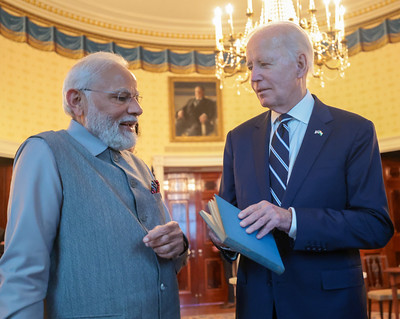G20 Summit: The foreshadowing of a new US-India relationship?
Melissa Myrtaj
Staff Writer
This year’s G20 Summit provides nations the opportunity for partnerships to proliferate. The annual G20 Summit is held under a rotating President, with this year being Narendra Modi, India’s Prime Minister. Prime Minister Modi has been proactive in using the feature of bilateral meetings of the summit’s agenda, notably with President Biden. They met around three months earlier at the White House, and President Biden arrived a day early in New Delhi to have another bilateral talk, according to NBC News. The two have been “strengthening their partnership due to the rise of climate change and artificial intelligence, alongside an increasingly assertive China,” and the two have had “more than a dozen in-person or virtual engagements since 2021” as a result, reported by NBC News. According to PBS, the bilateral meetings offer flexibility to a “sometimes rigid geopolitical order or focus on issues outside the formal agenda.” However, these bilateral relationships and agendas can raise tensions with other nation-states with the overall mission of the G20, according to G20, of addressing “trade, sustainable development, health, agriculture, energy, environment, climate change, and anti-corruption.”
The bilateral meetings between the U.S. and India over trade can potentially provide nations an alternative to China’s nation-spanning infrastructure program, which could increase tensions between nation states. President Biden and Prime Minister Modi are collaborating in the U.S.-based General Electric and India-based Hindustan Aeronautics to produce jet engines for “Indian aircraft in India and the sale of U.S.-made armed MQ-9B SeaGuardian drones,” stated NBC News. Furthermore, on the G20 Summit agenda, they announced a collaborating project with other nations to build a rail and shipping corridor linking India with the Middle East and Europe according to The Associated Press. Modi, speaking through a translator, stated “Enhancing connectivity with all regions has been a key priority for India…We believe that connectivity is a means to not only increase mutual trade between different countries but also increase mutual trust.” However, a Chinese think tank rebutted that India is trying “to take advantage of its role” as the host of the summit and harm China’s interest. According to Reuters, “Premier Li Qiang represented China in place of President Xi Jinping.” China and India have had their tension, and this Summit can be seen as another way to scrutinize Chinese businesses and investments. However, President Biden, talking about President Xi Jinping, stated was “disappointed” but would “get to see him,” Reuters stated. As the U.S. and India continue to collaborate at this summit and downplay their relations with the Chinese President, this can misrepresent the “premier forum of international economic cooperation,” stated on the summit’s website, G20.
Additionally, as President Biden and Prime Minister Modi have been working together on the agenda of the G20, their partnership has sparked concerns from activists and some American lawmakers regarding India’s human rights record on Modi’s watch, according to The Associated Press. There is additional “scrutiny as India abstained from voting on UN resolutions condemning Russia and refused to join the global coalition against Russia, as well as increasing its purchases of oil from Russia”, commented The The Associated Press. According to The Associated Press, “Ukraine President Volodymyr Zelenskyy was not invited by Modi’s government to this year’s gathering, though President Biden spoke at the sessions about Russia’s war in Ukraine negatively impacting many other nations.” Russia’s war in Ukraine is an issue that cannot be trivialized to placate the U.S.-India relations and for the sake of trade, especially when the forum’s multilateral agenda is the main concern, which puts Russia’s war in Ukraine top of the list.
The G20 summit should be viewed with punctiliousness as “critics of Prime Minister Modi believe that he is using the summit to promote his country as a major global power, and himself as an important world leader,” said BBC News. U.S. and India’s allyship having a platform for bilateral meetings based on the agenda of the G20 summit creates avenues that could be dead ends if the summit was strictly a multilateral meeting. However, the absence of certain leaders does not omit the tense and rigid environment and even heightens the underlying issues. The G20 offering bilateral and multilateral meetings can be taken advantage of by discussing conflicting viewpoints instead of abstaining from them. Therefore, the new deals and partnerships of trade produced by the G20 can be opportunities to bring world leaders to the forefront of world issues. Prime Minister Modi and President Biden have their differences in how they govern their countries, yet minimizing interactions with powers like China and Russia in the interests of the economy, such as trade deals, could lead to disastrous consequences for the international community.
Image courtesy of Flickr

